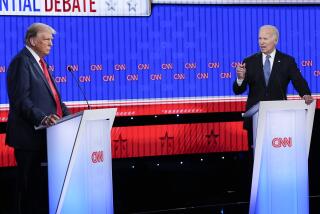Bush offers to take climate lead
WASHINGTON — On the eve of a major international summit, President Bush proposed Thursday that the United States and the other nations that produce most of the gases responsible for global warming initiate a campaign to limit emissions and set long-term goals for reductions.
The president, who is leaving Monday for a weeklong European trip built around the meeting of the Group of 8 industrialized nations, unveiled a proposal to set an international course to fight global warming, calling for an attack based on clean-environment technology, efficient use of fuel and the conservation of forests, which absorb carbon dioxide.
“The United States takes this issue seriously,” Bush said.
The president has long been criticized for inaction on what is now widely seen as one of the most critical issues facing the world. He has rejected limits on emissions, which might hurt industries, and the Kyoto Protocol, which calls for emissions to return to 1990 levels by 2012.
Bush’s announcement follows his imposition Tuesday of sanctions intended to pressure Sudan to stem the violence in Darfur and his call Wednesday to dramatically increase U.S. spending on HIV/AIDS. Taken together, the actions -- in a slow news week with Congress in recess -- suggested a burst of administration energy directed at some of the most troublesome international issues.
On Thursday, neither the president nor senior administration officials presented specific goals to reduce greenhouse gas emissions. Such targets would be set in the next 18 months -- a period that would run one month past the election to choose his successor.
As he has before, Bush emphasized technological innovation as the solution. “We need to harness the power of technology to help nations meet their growing energy needs while protecting the environment and addressing the challenge of global climate change,” he said.
Some of his most persistent critics praised him for taking on the issue. But they also expressed skepticism, saying that mandatory limits on emissions were the only way to turn around the growing release of carbon dioxide and other greenhouse gases blamed for causing Earth’s temperature to rise.
“Gathering the world’s largest emitters to discuss global warming is a good idea,” said David B. Sandalow, a scholar at the nonpartisan Brookings Institution think tank who dealt with environmental issues at the National Security Council and the State Department during the Clinton administration. “However, relying on voluntary targets for a problem as serious as global warming is a bad idea.”
Others said Bush was merely responding to the approaching summit. German Chancellor Angela Merkel, the host, had pressed to set limits on global warming that would effectively cut emissions to half of 1990 levels by 2050. U.S. representatives objected to the proposal.
Daniel A. Lashof, climate center science director of the Natural Resources Defense Council, said, “It seems to me that he felt like he needed to say something before going to the G-8 meeting where Germany and other countries are putting a lot of pressure on the U.S. to get with the program in terms of addressing global warming.”
Bush’s unexpected initiative drew cautious praise from Merkel. Speaking in Berlin, she said, “What is positive is that we can see from the speech that the U.S. president made earlier today that nobody can ignore the question of climate change.”
In an interview with Britain’s Sky News, British Prime Minister Tony Blair called Bush’s proposal a “huge step forward.”
“I think the important thing is -- for the first time America is saying it wants to be part of a global deal,” he said.
Bush’s effort is intended to negotiate an agreement that would replace the Kyoto Protocol, which expires in 2012. The U.S. never ratified that agreement and is not bound by it.
The Bush administration and some Democrats have argued that the Kyoto pact would unfairly put heavy restraints on the U.S. economy while letting India, China and other growing but less developed nations build industries on the increased use of highly polluting oil and coal.
The response of India and China, which are not G-8 members but will take part in some sessions, could be crucial to the outcome of the talks. A senior White House official said China was expected to surpass the United States in greenhouse gas emissions perhaps before the end of this year.
China and India “are still very sensitive to ... committing to long-term objectives,” said the official, who spoke anonymously because he did not want to upstage Bush. He said that there would be a “very intensive, very high-level” international discussion in the next six months, but that “trying to pull this off in 18 months will be herculean.”
White House officials presented Bush’s proposal as the start of a campaign to bring together the United States, the European Union, China, India, Brazil, Russia and Japan, which spew the most greenhouse gases into the atmosphere, as well as other nations, with the goal of establishing a framework for tackling global warming as far out as 2050.
At the same time, individual countries would set their own goals for the next 10 or 20 years. Although they might be binding, those goals would not necessarily be enforceable by international bodies, said James L. Connaughton, chairman of the White House Council on Environmental Quality.
Bush also wants to start talks with various nations’ representatives of key industries, including power generation, transportation and construction -- each responsible for large amounts of greenhouse gases.
In addition, he called for trade agreements that would reduce tariffs on technology that could help reduce emissions.
The administration’s plan is part of a broader attempt to wrestle with a number of issues tied to the environment and energy. In January, the president unveiled a proposal to increase usage of renewable and alternative fuels to reduce use of petroleum products by 20% over 10 years.
He has been under pressure to order higher vehicle gas mileage standards, impose mandatory caps on power plant emissions, and support legislation to require utilities to generate more energy from cleaner sources.
“Enough talk. It’s time for action,” Sierra Club Executive Director Carl Pope said in a written statement.
Rep. Edward J. Markey (D-Mass.), chairman of the House Select Committee on Energy Independence and Global Warming, said Bush’s plan “just rewarms old ideas.” He said that “companies, states and the rest of the world are already engaged in robust discussions and taking real action to cut heat-trapping emissions.”
California’s Republican governor, Arnold Schwarzenegger, applauded Bush for agreeing to begin such talks. “The most important thing is speed, to do this whole thing as quickly as possible,” he said.
*
richard.simon@latimes.com
Times staff writers Janet Wilson in Los Angeles and Evan Halper in Sacramento contributed to this report.
More to Read
Get the L.A. Times Politics newsletter
Deeply reported insights into legislation, politics and policy from Sacramento, Washington and beyond. In your inbox three times per week.
You may occasionally receive promotional content from the Los Angeles Times.











